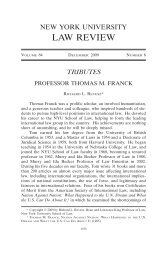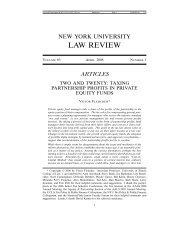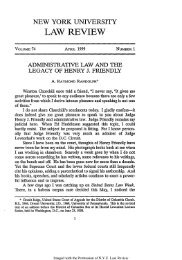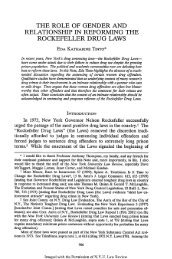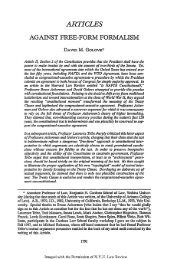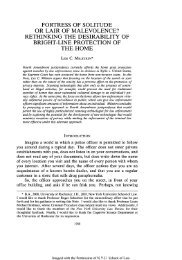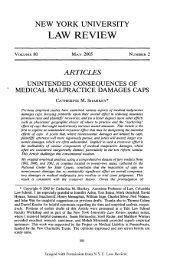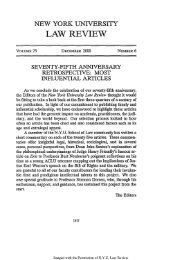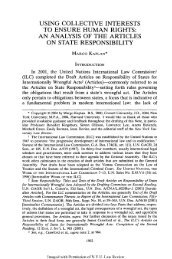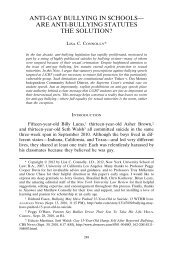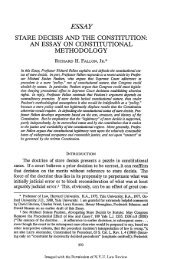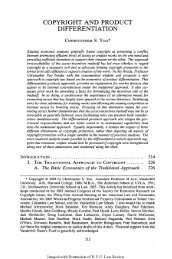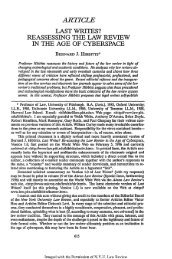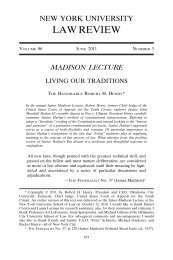Immigrants and the Right to Petition - NYU Law Review
Immigrants and the Right to Petition - NYU Law Review
Immigrants and the Right to Petition - NYU Law Review
You also want an ePaper? Increase the reach of your titles
YUMPU automatically turns print PDFs into web optimized ePapers that Google loves.
Imaged with <strong>the</strong> Permission of N.Y.U. School of <strong>Law</strong><br />
NEW YORK UNIVERSITY LAW REVIEW<br />
[Vol. 78:667<br />
Founding generation. The his<strong>to</strong>ry of colonial <strong>and</strong> early American immigrant<br />
petitioning also corresponds with English traditions, which<br />
guaranteed <strong>the</strong> right <strong>to</strong> petition <strong>to</strong> all individuals. The absence of<br />
alienage classifications on petitioning is consistent, moreover, with <strong>the</strong><br />
reality that "citizenship" <strong>and</strong> membership in a "national community"<br />
were ambiguous, inchoate notions at <strong>the</strong> Founding, notions that were<br />
intentionally submerged for fear <strong>the</strong>ir discussion would force a confrontation<br />
with <strong>the</strong> sectional disagreements over slavery. 2 76<br />
In light of this his<strong>to</strong>ry, if <strong>the</strong> Framers truly intended <strong>to</strong> exclude<br />
immigrant petitioners from constitutional protection, one would expect<br />
<strong>to</strong> find at least some evidence <strong>to</strong> this effect. But <strong>the</strong> Verdugo-<br />
Urquidez Court offered none, nor has research uncovered any. His<strong>to</strong>ry<br />
strongly suggests that <strong>the</strong> use of <strong>the</strong> word "people" ra<strong>the</strong>r than<br />
"'persons" in <strong>the</strong> First Amendment was not in any way intended <strong>to</strong><br />
exclude noncitizens from <strong>the</strong> rights safeguarded <strong>the</strong>rein. Any argument<br />
for <strong>the</strong> exclusion of immigrants from <strong>the</strong> <strong>Petition</strong> Clause must be<br />
pitched on grounds o<strong>the</strong>r than his<strong>to</strong>ry.<br />
III<br />
THE PETITION CLAUSE AND IMMIGRANT COMMUNICATIONS TO<br />
LAW ENFORCEMENT AGENCIES<br />
If <strong>the</strong> First Amendment guarantees all persons in <strong>the</strong> United<br />
States, regardless of <strong>the</strong>ir citizenship status, <strong>the</strong> right <strong>to</strong> petition <strong>the</strong><br />
government for a redress of grievances, <strong>the</strong>n do barriers <strong>to</strong> immigrants<br />
petitioning law enforcement agencies have constitutional implications<br />
Consider an undocumented immigrant who is <strong>the</strong> victim of a<br />
violent crime, or whose labor rights have been egregiously violatedor<br />
both, as in <strong>the</strong> cases of Gregorio Zarma Goyo <strong>and</strong> Beatrice<br />
Okezie 277 -but who hesitates <strong>to</strong> seek redress from law enforcement<br />
authorities for fear of deportation. It is wildly unsound policy <strong>to</strong> deter<br />
Goyo, Okezie, <strong>and</strong> tens of thous<strong>and</strong>s of persons like <strong>the</strong>m, from petitioning<br />
<strong>the</strong> government for relief. In <strong>the</strong> following Part, I consider<br />
whe<strong>the</strong>r burdens <strong>to</strong> immigrants petitioning may also violate <strong>the</strong> <strong>Petition</strong><br />
Clause.<br />
276 See, e.g., Smith, supra note 135, at 116 (observing ambiguities in meaning of citizenship<br />
at Founding); see also Raskin, supra note 134, at 1401 ("To exclude aliens from voting<br />
would have given rise <strong>to</strong> <strong>the</strong> dangerous inference that U.S. citizenship was <strong>the</strong> decisive<br />
criterion for suffrage at a time when <strong>the</strong> majority of U.S. citizens, including almost all<br />
women <strong>and</strong> substantial percentages of men without property, were categorically excluded<br />
from <strong>the</strong> franchise.").<br />
277 See supra notes 1-2 <strong>and</strong> accompanying text.



